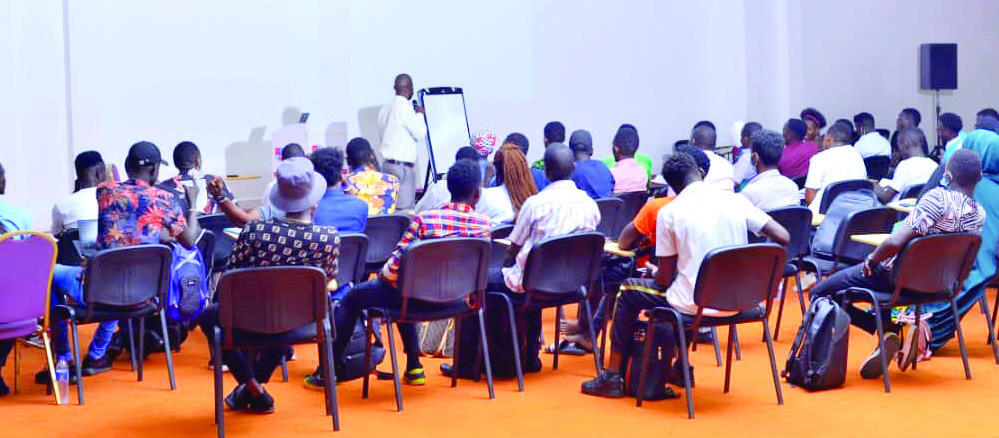This article was first published in the New Vision on May 26, 2021
Dr Pontian Kabeera
The world has faced a rare period that certainly has involved substantial distraction. COVID-19 has put the world on its knees, forcing millions of people to change their way of life. Of course, this comes with likely possibility for further education unsteadiness.
Surely, uncertainty is an outrage to humanity hence it is not anything to wish for. Well, COVID-19 has unquestionably hurt all life fabrics, but the education sector has been extremely endangered. In fact, earlier education thinkers, like John Dewey, had foretold these education predicaments regarding the pursuit of education in times of uncertainty. But we must not lose the opportunities that have sprung from COVID-19. We must see the silver lining and take advantage of it, for the betterment of education systems in developing countries.
Education is purely founded on knowing, hence it flourishes on certainty affirmed by facts that are present in any instructional curriculum. It should, however, be noted that the curriculum has not been hurt by COVID-19 pandemic, the content within the curriculum remains valid in its inaccessibility. It is instead what happens in schools at all levels that has been hugely been altered.
In one of the great changes, COVID-19 has taught us that we cannot only focus on the classrooms to teach. We must embrace technology, but also use this moment of the re-opening for education institutions, to teach students how to read and research on their own.
Ultimately, the modes of teaching and learning due to COVID-19 have situated educational realities differently. In this case, the educational certainty has been housed in different types of educational practices; something that changes their original meanings.
Teaching and learning has become remote-based which is a new practice yet to be fully adjusted to by both the teachers and students.
With such conditions, pedagogies eventually change and as a result, the way of knowing equally changes and digital pedagogies become the key approaches for teaching and learning. Adjusting to new epistemological shift requires extra-ordinary shift from being a face-to face student to a distant student.

Yet to many schoolchildren, especially those from low socioeconomic background, this presents overwhelming challenges regarding the certainty of their education. This is because the ways of doing things have drastically changed and new approaches for an effective teaching and learning process may favour children from urban elite families. Well, while this could largely affect learners from less fortunate background, it, however, seems an all-round question that needs strategic mechanism to deal with.
This is why, we should now task the new Government being formed in Uganda, to pay more attention to new ways of sustaining education, in catastrophic moments,
Whatever happened around the round, can strike again! We have no guarantee that we will not be hit by other epidemics or situations like these in the future. But what we are sure of, is that it is within our powers as teachers, lecturers, parents and the Government, to prepare for what is likely to happen in future.
Way Forward
Since the old-age times, education in whatever form has been vital for a meaningful human existence and, therefore, no circumstances whatsoever should scoff such an alluring practice. Players in education should, therefore, establish a practical learning approach that can factor well within the dynamics of remote learning to address the uncertainty in the pursuit if knowing. These systems or practices, should be affordable to low income earners in our communities.
This could be done through different platforms ranging from radios, smartphones as well as TVs. Parents are primary actors in their children education, they should as well establish time to engage with them while at home, learning transcends classroom environment. Children’s/ students comprehensions begins from home.
Well, COVID-19 can be castigated for these social disorders, it has given us a different, but comprehensive view on how better we can pursue knowledge beyond the classroom environment. Parents should constantly use every time and activity at their disposal as a learning time with their children. Much as it is important to establish a remote structure for effective remote teaching and learning, in these times where the education sector is endangered, it is also important that we adopt the concept of learning flexibility to cut the monotony.
Online learning being a new concept to many learners, it at times looks odd to them. But we must change and make learning more active. That said, online learning is a risky dimension, especially to the young children. We should not also forget that digital gadgets can easily introduce the learners to wrong materials, which can easily dispel the relevance of remote learning; and we must be prepared to have solutions for this.
Teachers or parents should stay in close touch with the students to help them learn better. Children should be allowed to socially reach-out to their friends online and get to share their experiences. This heightens certainty of education and satisfies knowing during in face of adversity.
The writer is head of the education department at Victoria University

